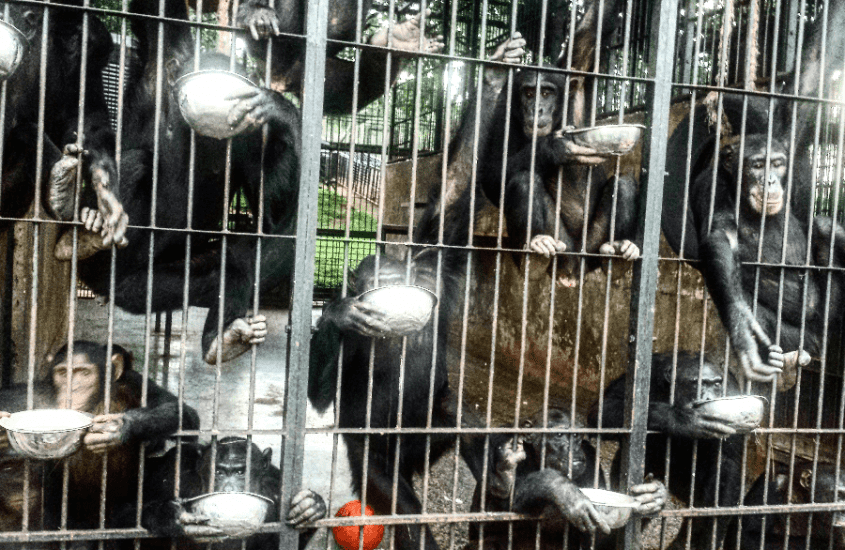The forest beasts who did not want sugar

On a trip to Ngamba Island Chimpanzee Sanctuary in 2015, the tour group I was a part of happened to be taught by a delightful young man with a skill I particularly respect. Paul, a caretaker and tour guide would give us all storytellers a run for our money. When he narrated the tense election period in the sanctuary apeland at that time, you knew that if equal mainstream media coverage and front page space was allotted, many African ‘democracies’ would pale considerably against Ngamba’s chimps political climate.
Paul also knew all the chimpanzees by name and could point to all as he spoke. There was Kalema and Umutama, Presidential hopefuls who were open to a democratic election process in which the troop of chimpanzees would elect a leader to replace the deceased Alpha male. Then there was Mawa – a quintessential self-proclaimed visionary whose only goal was forceful seizure of power. He told us that Mawa had a bodyguard, Asega, who constantly intimidated the rest of the chimps. Fascinating, I thought. We are really the descendants of these lovely beasts.
As Paul concluded our tour at the chimps’ feeding cages where they held metallic bowls and slurped their maize porridge, I could see why people traveled across oceans and paid hefty charges to see primates. But as I would learn 3 years later, chimpanzees aren’t always the fascinating-to-humans, cash cow of the tourism industry. They can quickly turn into a nightmare, and indeed like us their descendants, are quite vengeful. In 2018, I visited the Masindi village of Kasooha, near Budongo forest.
More than 10 years ago, chimpanzees passed through the part of the forest in Kasooha village on their way to Budongo. They did not take anything; instead they came bearing gifts of nature. Baguma, a resident told us that because they eat many plants and fruits, some of the undigested seeds in their excreta sink into the ground and yield more plants and fruit trees. The people didn’t need to do a lot of planting as you can imagine. The creatures – people and apes, lived in harmony.
Until investors cleared the chimpanzees’ part of the forest for a sugar production plant. The chimpanzees moved closer to the people and started combing through households – taking maize, mangoes and pawpaws. They also pitched camp at the village water source which made it nearly impossible for the womxn and children whose task it is in the community to collect water, to do so. A group of male locals set wire traps that amputated some chimps. Children threw stones whenever they saw one in the neighbourhood. And just like that, from a seemingly banal interaction of humans and animals, battle lines were drawn.
The chimps fought to the death, in retaliation. Many residents have scars, war marks from these, several battles. Others have lost more than some food, and skin tissue. They say that years ago a chimpanzee picked up a baby from a cloth on which its mother had placed it in the garden. Her screams attracted the locals who immediately pursued the primate – prompting it to drop the baby. The baby died instantly.
A teenage girl, Birungi survived a chimpanzee attack as a infant. If we go by the life or death standard, that is. The post-traumatic stress, not so much. With visibly little cognition, Birungi not only lives a minimally functional life – having to be fed while saliva flows down her perpetually opened mouth. Her mother said that sometimes she makes chimpanzee noises and has nightmares. She is an excruciating reminder to her family, of the terror that the chimpanzees have brought to them.
When you meet this family and hear their story, it is hard to see chimps as anything but villains in the moment. In fact, you might never see our evolutionary cousins the same way. Like the family, some residents of Kasooha want revenge (yes, on the chimps). Others are resigned to their fate and only holding on by the fikkle thread of charitable donations. Most just wish that the damn chimpanzees didn’t exist. They are each justified.
Now, we know that as with every unpleasant situation, it is the unaffected bystander who has the luxury to think objectively. On a motherhood conflict, it was the fictional, wise King Solomon. On sexism, always the middle-aged male intellectual, seeking dispassionate conversation. In Kasooha, it was I, a shielded tourist writer with a van waiting to drive her back to Kampala in time for a weekend book launch.
So here I am, armed with this information. Telling this story whose subject I hardly am. Opining that in the beginning, the chimpanzees too, were invaded. Their habitat had been cleared by human beings for the benefit of sugarcane production profits. Or jobs. Or whatever the papers say. Point is, when we clear forests, we threaten animals’ habitats. And animals, sigh. They do not negotiate or buy land or get jobs. Heck, they do not even consume processed sugar. What they can do however, is fight back – indiscriminately.


